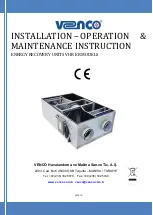
5-2-55, Minamitsumori, Nishinari-ku, Osaka 557-0063 JAPAN
Phone: +81(6)6659-8201 Fax: +81(6)6659-8510 E-mail: [email protected]
EM-1606 Rev.14 P. 1 / 5
INSTRUCTION MANUAL
RTD ALARM
(dual or quad alarm trip; field-configurable)
MODEL
AS4R
BEFORE USE ....
Thank you for choosing M-System. Before use, please check
contents of the package you received as outlined below.
If you have any problems or questions with the product,
please contact M-System’s Sales Office or representatives.
This equipment is for use in general industrial environ-
ments, therefore may not be suitable for applications which
require higher level of safety (e.g. safety or accident preven-
tion systems) or of reliability (e.g. vehicle control or combus-
tion control systems).
For safety, installation and maintenance of this equipment
must be conducted by qualified personnel.
■
PACKAGE INCLUDES:
RTD alarm (body + base socket) .........................................(1)
■
MODEL NO.
Confirm Model No. marking on the product to be exactly
what you ordered.
■
INSTRUCTION MANUAL
This manual describes necessary points of caution when
you use this product, including installation, connection and
basic maintenance procedures.
■
SYMBOLS USED ON THE PRODUCT AND IN THIS MANUAL
The symbol indicated on the equipment, means that the
user must refer to the related parts in the manual for safe
operation of the equipment. It is essential to read the in-
structions wherever the symbol appears in the manual.
WARNING
: is reserved for conditions and actions that
can cause serious or fatal injury.
CAUTION
: is reserved for conditions and actions that can
cause injury or instrument damage.
WARNING
■
INSULATION CLASS
Basic insulation (Signal input or output to Power input:
300V) is maintained.
If insulation failure may result in equipment, hazardous
voltage (maximum 240V) may result to signal input and
then electric shock may cause.
Prior to installation, prepare supplemental insulation
(equivalent basic insulation) between signal input and ex-
ternal circuits.
CAUTION
■
REGARDING SAFETY
If equipment is not used in a manner not specified by M-
System, the protection provided by the equipment may be
impaired.
■
CONFORMITY WITH LOW VOLTAGE DIRECTIVE OR UL
• This equipment is suitable for Pollution Degree 2, Meas-
urement Category II (output, transient voltage 2500V)
and Installation Category II (transient voltage 2500V).
• Altitude up to 2000 meters.
• The equipment must be mounted inside a panel.
• The equipment must be installed such that appropriate
clearance and creepage distances are maintained to con-
form to EU/UL requirements. Failure to observe these
requirements may invalidate the EU/UL conformance.
■
CONFORMITY WITH EMC DIRECTIVE
• Insert a noise filter for the power source connected to the
unit. TDK-Lambda Noise Filter Model RSNA-2006 or
equivalent is recommended.
• The actual installation environments such as panel con-
figurations, connected devices, connected wires, may af-
fect the protection level of this unit when it is integrated
in a panel system. The user may have to review the CE
requirements in regard to the whole system and employ
additional protective measures to ensure the CE conform-
ity.
■
SIGNAL INPUT
This terminal is used for signal input.
Do not connect or measure to the circuits including tran-
sient voltage 2500V.
Refer to “INPUT SPECIFICATIONS” in detail.
■
OUTPUT TERMINAL
Never use the output terminal under any load that exceeds
the rated values. Otherwise it will impair prescribed per-
formance and cause burning of the equipment itself.
■
WIRING
• For wiring connection, refer to “TERMINAL CONNEC-
TIONS” and wire correctly. Fire, electric shock and fail-
ure cause if wire are incorrectly connected.
• Wire using vinyl insulated power cable that meet input
voltage and load current for equipment and screw by an
adequate torque.
Loose screws may abnormally generate heat and fire may
cause. (Proper tightening torque [N·m] : 0.98 – 1.18)
• Do not install cables close to noise sources (relay drive
cable, high frequency line, etc.).
• Do not bind these cables together with those in which
noises are present. Do not install them in the same duct.























